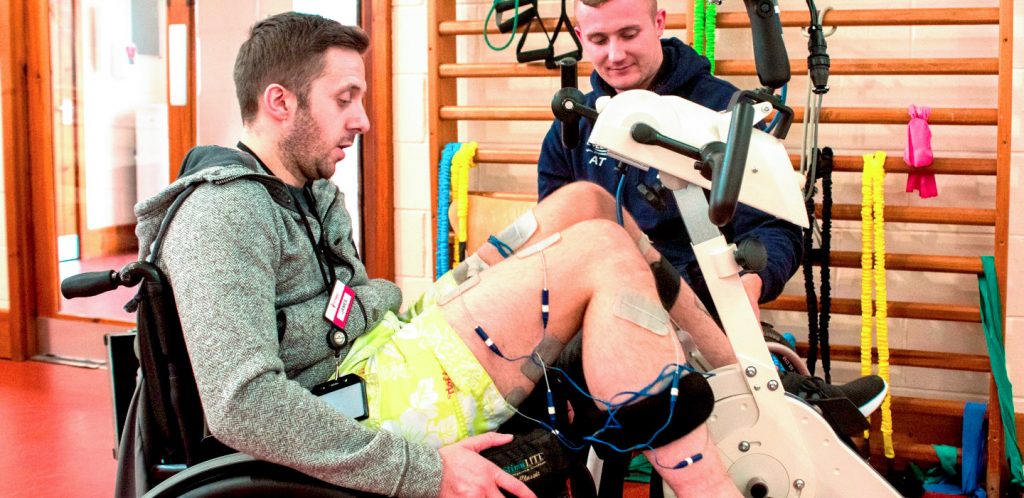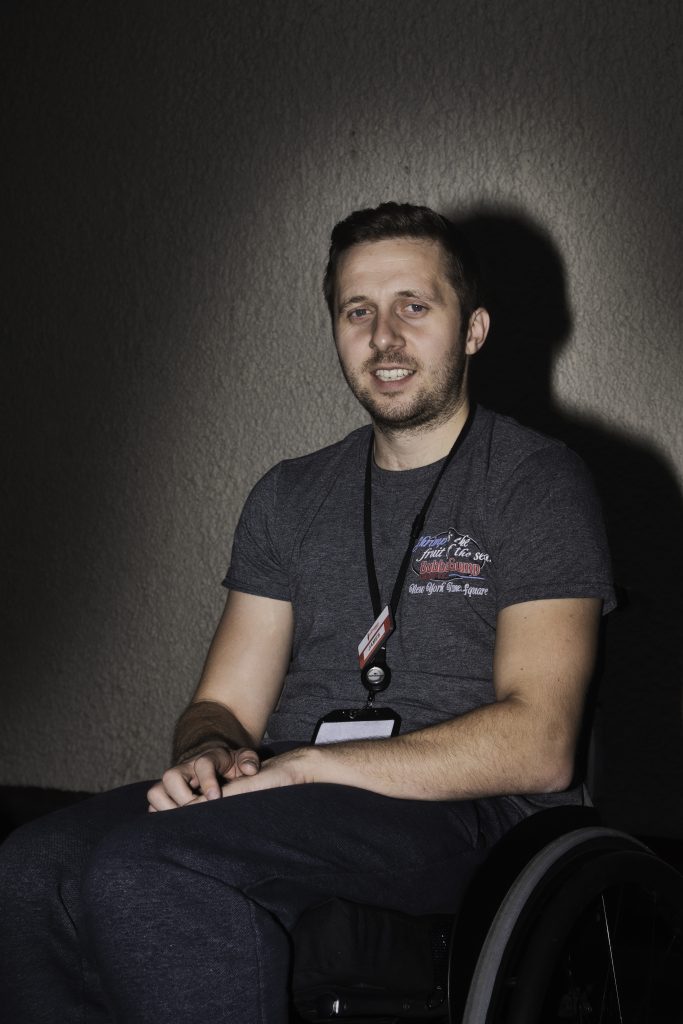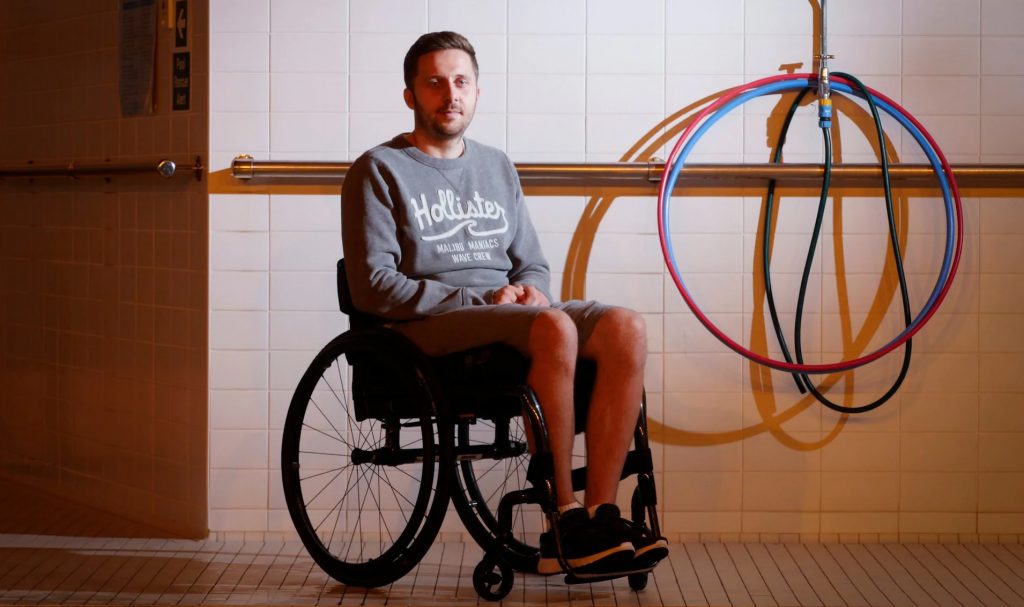I’d been a wholetime firefighter in London for six years, and then transferred to Norfolk for a year. I was on my stag do in Magaluf in the summer of 2016.
We’d only been there for a few hours when my friends decided to go for a swim. It was dark, but I stupidly went along with it and ran into the sea. I think I tried to dive, but hit my head on the seabed and blacked out.
When I came to, I tried to stand up and nothing happened. From medical experience through my job, I knew what that probably meant. I couldn’t lift my head out of the water and I’d gone deeper, so I had to drag myself under and try to swim. I headed towards the lights of the beach, hoping someone would find me. My friend saw splashing, so I went towards him and grabbed his leg. I told him how to get me out carefully, while keeping my neck straight. He got the other lads to help me and they got me out. The next thing I know, I’m waking up in a hospital in Palma, being told that I had broken my neck.
It really wasn’t the best way to start a stag do… One minute I was having fun with my mates, the next I’m in hospital, unable to move. My Best Man didn’t know what to do. He knew it was his job to phone home and tell them, but he didn’t how to make the call, how to tell anyone what had happened, because he was devastated, and we didn’t know the full extent.
“I tried to stand up and nothing happened. From medical experience through my job, I knew what that probably meant.”
James Thorpe
My family and fiancé flew out. My dad got there first; he’d been in Prague with my mum, and due to fly home, so she went back to get more clothes, then followed him out a day later. They were obviously worried sick, and when my Dad got there, I was still in a critical condition and they didn’t even know if I would make it.
They had to wait until after the operation to find out if I’d be out of the woods, because anything could go wrong during it. They took part of my hip bone and grafted it onto the broken vertebrae in my neck, fusing three vertebrae together with a bit of bone and metal plating.
I was in the hospital in Palma for 12 days, while we waited for my travel insurance to decide if they would pay to get me back to the UK or not. They wanted blood test results to see how much alcohol I’d had in my system, because the policy didn’t cover being drunk, but I hadn’t had a lot to drink at the time of the accident. Then the British media got hold of the story and the fact my insurance was playing up, and all of a sudden they changed their mind and said they could get me home. So they sent a medevac plan over with a doctor and a nurse, and they flew me back to Doncaster airport, and from there, straight to Sheffield Spinal Unit.
I was told I would be there for three or four months. That was a shock. If you have an accident, you think you might be in for a few days max, get better, and then come out. But this was almost like being given a jail sentence.
I spent three months in hospital. They had to make sure I was stable in myself, to be as independent as possible before I left. I couldn’t move anything from below my chest, but my aim was to not to have to rely on carers. But the accident affected by hands, so everyday tasks were difficult. Luckily, after a lot of hard work and exercise, I could use my hands a lot more. My bodily functions, strength and balance all got a lot better. I could get myself out of bed into a wheelchair, wash myself, things like that. So they didn’t see the need for a carer.
“If you have an accident, you think you might be in for a few days max, get better, and then come out. But this was almost like being given a jail sentence.”
James Thorpe
It wasn’t until my last night in hospital that I could wiggle my big toe. I wasn’t completely paralysed. It’s called an incomplete injury; my spinal chord was still intact in certain areas, and I could feel my legs and toes. I managed to get a bit of movement in my legs, and got to the point where I could stand with help and walk a few steps with a zimmer. I stood up for my wedding, but I had a bit of an illness with some injections that went wrong, so was poorly for a few months, and haven’t been able to get back to that point since.
Fire Fighters Charity got involved really quickly. While I’d been in hospital, my friend had been speaking to them and someone came to my house to talk to me. I left hospital in September 2016, and in October, I made my first visit to Jubilee House. It was really good there, and was nice having support from people who knew what they were doing. Having the nursing staff there was a great bonus, and they made me feel so welcome. Also, having that psychological support, everything in one place, was good. Mine was a life-changing injury that affected my mental state, so I appreciated having someone to talk to and work things through with.

It definitely hit me hard. I had tried to be quite positive during my rehab, and kept saying “It’s not over yet” and I was determined not to let it beat me. I kept pushing to get the most recovery that I could, but then at the back of my mind was always the thought that I’d never be a firefighter again. I’d always been so independent, fit and healthy, and having that all taken away from you, it really gets you down.
I got divorced a year after getting married. My injury totally changed everything, it changed our whole lives. All the things you’re used to, they’re not there anymore, and it’s hard to adapt. With some people it works, with others it doesn’t.
I keep going back to Jubilee House every six months or so. Mentally and physically, I wouldn’t be where I am now without them. It can be hard to be among people talking their lives as a firefighter, because I do miss it, but the banter and camaraderie is like being back on the watch. It’s a bit bittersweet, but it’s definitely more good than bad.
To me, recovery means getting as much back as possible to make life easier. My goal has always been to at least stand up, just to make everyday tasks easier, like getting things out of cupboards or pick things up off the floor that I drop, having a little bit more independence. It’s affected all my core strength, so I’ve had to learn how to balance, even in a wheelchair.
“To me, recovery means getting as much back as possible to make life easier. My goal has always been to at least stand up.”
James Thorpe
People do behave differently towards me than they used to, even some friends, who don’t know how to talk to you or think they shouldn’t invite you to things. I just want people to treat me the same, how they used to; give me a call, see what I’m up to, rather than assuming I won’t be able to do things. I have a few great mates who have really stuck by me, one who comes to the gym with me and passes me weights etc, and another who came on holiday with me. He has his own young family, but he knew I was feeling a bit down, so took the time to go with me for a few days.
I’ve started seeing someone new over the last few months. She’s lovely and really patient. Dating when you’re in a wheelchair is hard. You don’t think anyone will ever want you. I know it sounds silly, but you think, I’m not normal, why would anyone want me? Why would someone want to be with someone when you have to check everywhere you’re going is accessible for a wheelchair? You don’t think you’ll find someone who finds you attractive, or looks at you lovingly. But she’s absolutely lovely and accepts me for who I am. You don’t think you’ll ever be as happy as before, but I really am, happier even.
She has a four-year-old daughter who has accepted me and my wheelchair absolutely. She doesn’t see her dad, so loves having a man around the house again. And she loves that I’m in a wheelchair; she knows my legs don’t work so she uses it to her advantage, running up the stairs when I’m chasing her, knowing I can’t follow. She’s so innocent, we could learn a lot from the way children teach people with disabilities.
“We could learn a lot from the way children teach people with disabilities.”
James Thorpe
My family are amazed by my progress, seeing how much I’ve overcome. They saw how much it hit me when I was in hospital, and then with the divorce they were really worried about me. But seeing where I am now, they’re so happy.

My mental state is a hell of a lot better than it was. You have down days, especially if you’re tired and something will go wrong, so it can snowball. But I generally see the positives now. I own a bathroom fitting company with my dad, specialising in mobility bathrooms, after we saw how some companies were ripping off vulnerable people. I like that I’m still able to help people, which will always be a part of me, even if I can’t be a firefighter, and I can appreciate things I hadn’t seen before. I’ll say to my dad, you can’t put a handle or a ledge there, it’ll get in the way of their wheelchair. It’s a world I know, so I can empathise. I’d always wanted to own my business, and who knows if I’d ever have done this without my accident.
You never know what’s going to happen to you. You don’t think you’ll ever need help. I certainly never thought I would.
I remember seeing posters for Fire Fighters Charity when I was still working, doing car washes etc, but I didn’t realise how good the facilities were, but you never think you’re going to need it. When you make donations, you think you’re helping someone else. And when money is a bit tight, you don’t think of donating to the charity. But when you’re faced with a situation where you yourself need them, if you could, you’d go back in time and pay in every month and raise as much money as possible.
The facilities that are available are life-changing; it doesn’t matter if it’s an injury like mine or a shoulder that is playing up and stopping you from working, they change people’s lives. You don’t think you’ll ever need it, but when you do, you’re so grateful it’s there.

